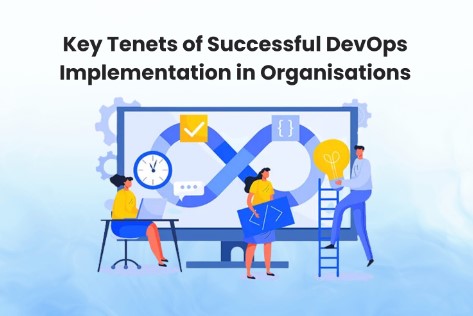Modern software development has grown to link efficiency and agility with DevOps practices. In an effort to bridge the gap between the development and operations teams, many firms are turning to the groundbreaking ideas of DevOps. In this blog, we will delve into the fundamental concepts that enable effective implementation.
Whether you’re an experienced IT professional or just beginning your DevOps Certification Course, understanding these DevOps concepts is essential for staying current in the software development industry.
Cultivating a Collaborative Culture
A culture of cooperation is essential to the success of any DevOps setup. It is not just a theoretical ideal but also an absolute imperative for development and operations teams to break down their silos. Developing an environment of open communication, shared accountability, and respect is critical to adopting a DevOps attitude. Teams work together like a well-rehearsed symphony, with each instrument adding to the final composition’s harmony. Establishing the groundwork for a smooth integration of processes requires understanding the interdependence of roles and functions.
Automation
Automation and DevOps go hand in hand when pursuing operational excellence. Organisations free up their personnel to concentrate on strategic goals and innovative problem-solving by automating monotonous chores. The automation mantra speeds development, decreases mistakes, and optimises procedures for everything from code release to infrastructure provisioning. Automation technologies are used sparingly in a robust DevOps implementation to facilitate software delivery rather than act as barriers.
Continuous Integration and Continuous Deployment (CI/CD)
CI/CD is the lifeblood of effective software delivery in DevOps. Code updates are often integrated into a shared repository using continuous integration, which enables teams to find and fix problems early in the development cycle. Continuous Deployment guarantees that verified code changes are automatically sent to production, supporting continuous integration. When combined, these methods improve development’s agility and encourage a dependable, quick release schedule. A firm grasp of CI/CD techniques is often found to be essential for success in DevOps certification courses for aspiring practitioners.
Monitoring and Feedback Loops
Beyond just deploying code, DevOps also involves careful monitoring and a feedback system. Teams can proactively address problems when they access real-time information regarding application performance, infrastructure health, and user experience. Implementing efficient monitoring systems and feedback loops facilitates the detection of bottlenecks and inefficiencies. This iterative method guarantees that every development cycle adds to a more responsive and robust system, which is consistent with the DevOps idea of continuous improvement.
Security
Software security cannot be neglected during development. From concept to deployment, DevOps incorporates security into every stage of the development lifecycle. Security concerns are essential elements that protect the confidentiality and integrity of applications, not obstacles. Integrating security into the DevOps process reduces risks, and the final product meets the highest compliance and data protection requirements.
Scalability and Flexibility
A DevOps implementation’s capacity to scale is evidence of its flexibility in the face of changing needs. A well-constructed DevOps infrastructure easily adapts to the evolving demands, regardless of the organisation’s rate of growth or workload fluctuations. Scalability encompasses teams and procedures in addition to infrastructure. No matter how big or complicated the project becomes, DevOps techniques are sure to stay successful due to their capacity to scale horizontally and vertically.
The Role of DevOps Certification Courses
A vital component of the transition to a DevOps-oriented workplace is education. DevOps certification programs provide an organised and thorough grasp of the concepts, instruments, and procedures that characterise this revolutionary methodology. These courses offer practical experience and academic knowledge, enabling professionals to use DevOps ideas in practical circumstances. By adopting such courses, teams may embrace continuous learning and keep current on industry best practices, promoting creativity and a culture of continuous development.
Data-Driven Decision Making in DevOps
Decisions in DevOps are now driven by data rather than just gut feeling. Using analytics and metrics offers priceless insights into how well development and operational processes work. Data-driven decision-making becomes essential to DevOps’s success, from finding improvement areas to anticipating possible bottlenecks. Using analytics in DevOps creates a continuous improvement culture in which all decisions are based on the vast array of data produced throughout the software development lifecycle.
Conclusion
Adopting DevOps principles is not only a fad in contemporary software development but a strategic need. Adopting a DevOps mentality becomes essential for success as organisations traverse the intricacies of digital transformation. The fundamentals discussed in this blog might be a roadmap for anybody considering a DevOps certification program or managing a team throughout a DevOps transition. Promote CI/CD, embrace automation, foster teamwork, keep an eye on everything constantly, give security priority, and build with scalability in mind. By doing this, you set the stage for a time in the future when your company prospers in the rapidly changing world of technology.

